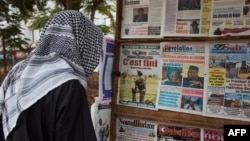Mali's military government this month banned popular French radio and TV broadcasts after Radio France Internationale reported on alleged rights abuses by the Malian army and Russian mercenaries. The restrictions come as press freedom advocates cite a worrying trend of pro-Russian propaganda in countries where the mercenaries are working with government forces.
On March 18, the director of information at Joliba TV News, Mohamed Attaher Halidou, made a televised address from the station’s Bamako studio.
Halidou asserted that a free press plays an important role in democracy, and he criticized the lack of condemnation by Malian media organizations over the ban of French broadcasts.
This came days after Radio France Internationale and France 24 television were taken off the air in Mali. The government banned the broadcasts in response to reports by RFI on human rights abuse accusations against Mali’s army and mercenaries from the Wagner Group, a private Russian military contractor.
Speaking to VOA, Halidou said there is widespread self-censorship in Mali, as both civilians and journalists fear reprisal from Mali’s military rulers.
Today, he said, fear has changed everything, because journalists, even before writing an article, start to think: “What am I going to say in this article? Is it going to bother those in power?” There is this pressure now that weighs on journalists, he says. Freedom of expression is threatened. There is nothing worse for a journalist than to self-censor, he said.
Mali’s government has refused to grant accreditation to foreign journalists in recent months, deported a French reporter, and imprisoned an economist after he spoke to the press about international sanctions that have been imposed on Mali.
Arnaud Froger, head of the Africa desk at Reporters Without Borders, speaking from Paris, said the current situation in Mali strongly resembles what happened in Central African Republic in recent years, with Russian mercenaries on the ground, government restriction of media, and self-censorship among journalists.
“Journalists were targeted, and media outlets were not really allowed to operate and to tackle sensitive issues such as human rights abuses and also particularly what the Russian mercenaries were doing,” he said.
Froger also said that fake news targeting France and in favor of the mercenaries was widespread.
Abdoulaye Guindo is the coordinator of Malian news website Benbere, which has a platform that debunks false reports and propaganda that circulate online in the country. Speaking from Conakry, Guinea, where he is attending a conference, Guindo said that he first noticed a spike in disinformation after the 2021 coup, when the current military leaders took power for the second time in less than a year.
He said, we have noticed an increase in fake news directed against European forces, notably Barkhane and the U.N. peacekeeping mission in Mali, and we’ve also noticed a lot of fake news which he said was meant to glorify Wagner troops and to push the population to applaud and to accept the arrival of the Wagner force in Mali.
Operation Barkhane is the French anti-insurgent military operation that is in the process of withdrawing from Mali.
Froger said that though the situation is tense for now, Mali is not as isolated as the Central African Republic, and he believes that press freedom in the country will eventually improve, either through a change in policy or the handing over of power.




